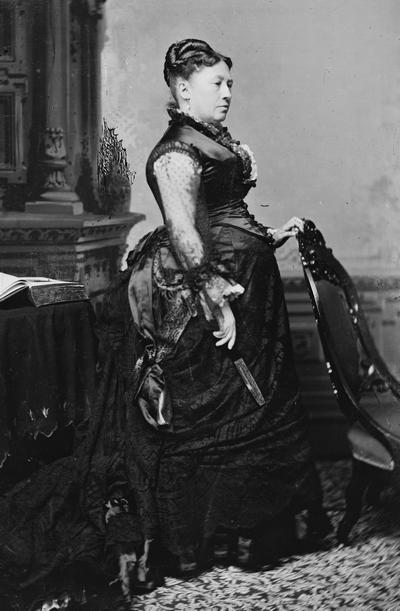Julia Grant (Julia Grant)

Julia Boggs Dent was born at White Haven plantation west of St. Louis, Missouri, the daughter of Colonel Frederick Dent, a slaveholding planter and merchant, and Ellen Wrenshall-Dent, Julia squinted through crossed eyes. In memoirs prepared late in life—unpublished until 1975—she pictured her girlhood as an idyll: “one long summer of sunshine, flowers, and smiles”. She attended the Misses Mauros’ boarding school in St. Louis for seven years among the daughters of other affluent parents. She excelled in art and voice. A social favorite in that circle, she met Ulysses at her home, where her family welcomed him as a West Point classmate of her brother Frederick; soon she felt lonely without him, dreamed of him, and agreed to wear his West Point ring.
Grant proposed several times. When Julia finally accepted, they were sitting on the front steps of her beloved childhood home, White Haven, a picturesque plantation. In 1844 they embarked on a 4-year engagement, delayed by the Mexican-American War, during which they saw each other only once. They married on August 22, 1848 at White Haven when Julia was 22 and Ulysses was 26. Neither of their fathers approved of the match–hers because Grant’s career-soldier prospects seemed bleak, and his because the Dents were slaveholders. Grant’s parents even refused to attend the wedding. They did accept Julia eventually.
The Grants’ marriage was often tried by adversity and it met every test, as the couple gave each other lifelong loyalty. Like other army wives, “dearest Julia” accompanied her husband to military posts, where she passed uneventful days at distant garrisons. When he was ordered West in 1852, she returned to his parents’ home. Grant resigned his commission 2 years later, ending that separation. When farming and business ventures in St. Louis failed, he took his family back to his home in Galena, Illinois in 1860. Grant was working in his father’s leather-goods store when the Civil War called him to a soldier’s duty with his state’s volunteers. Throughout the war, Julia joined her husband near the scene of action whenever she could.
After many years of hardship and stress, she rejoiced in his fame as a victorious general, and she entered the White House in 1869 to begin, in her words, “the happiest period” of her life. With Cabinet wives as her allies, she entertained extensively and lavishly. The social highlight of the Grant years was the White House wedding of their daughter in 1874. Contemporaries noted her finery, jewels, and silks and laces. After four years of war, an assassination, and an impeachment trial, Washington was ready for a little levity, and Julia obliged. She offered a full array of events and became a popular hostess. She planned lavish state dinners, where guests enjoyed expensive wines and liquors. As First Lady it was suggested to her that she have an operation to correct her crossed eyes, but President Grant said that he liked her that way.
Upon leaving the White House in 1877, the Grants made a trip around the world that became a journey of triumphs. Julia proudly recalled details of hospitality and magnificent gifts they received. A highlight of the trip was an overnight stay and dinner hosted for them by Queen Victoria at Windsor Castle in England. They also enjoyed a swing through the Far East, being cordially received at the Imperial Palace in Tokyo by the Emperor and Empress of Japan. In 1884 Grant suffered yet another business failure and they lost all they had. To provide for his wife, Grant wrote his famous personal memories, racing with time and death from cancer. The means thus afforded and her widow’s pension enabled her to live in comfort, surrounded by children and grandchildren, until her own death in 1902 at age 76.
She became the first First Lady to write a memoir, though she was unable to find a publisher, and had been dead almost 75 years before “The Personal Memoirs of Julia Dent Grant (Mrs. Ulysses S. Grant)” was finally published in 1975. She had attended in 1897 the dedication of Grant’s monumental tomb overlooking the Hudson River in New York City. She was laid to rest in a sarcophagus beside her husband. She had ended her own chronicle of their years together with a firm declaration: “the light of his glorious fame still reaches out to me, falls upon me, and warms me.”
Born
- January, 26, 1826
- USA
- St. Louis, Missouri
Died
- December, 14, 1902
- USA
- Edgerton, Wisconsin
Cemetery
- General Grant National Memorial
- Manhattan, New York
- USA





